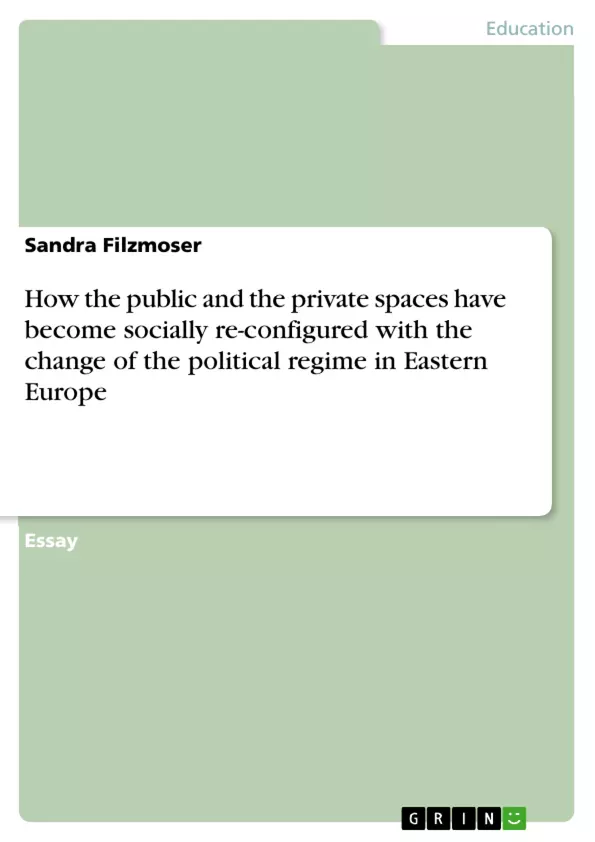Milan Kundera dedicates one chapter of his fist novel on how much the policy of the communist regime connected the private sphere with the public one. His example of a village chapel shows how the communists connect the fate of the party with the one of the entire chapel. The policy was to ‘melt’ private and public life. Thus cultural associations and activities were generously supported and as time passes political reserves disappeared. The amalgamation was done. The party had access and interfered in every single facet of life. Due to that, the new setting after the fall showed changes in life of the people to which I will dedicate this essay.
The fall of communism altered the political and the economic system. The paradigm was changed reciprocally with it and caused confusion in the value system as in material assets. Hence, people had to redefine their identities. Birgit Müller connects the altered values with politics through the involvement of emotions and explains the difficulty of the new democratic system. The structural change didn’t easily find implication on the local level. Müller describes that “[p]olitical power was still seen as a total force, not as the result of a communicative act.” This phenomenon resulted in her example of a village in a Czech Village in personal attacks in public. “The public space was … not the forum for an engaged exchange of ideas and opinions.”
Inhaltsverzeichnis (Table of Contents)
- Introduction
- The Fall of Communism and Its Impacts
- The Paradigm Shift and Identity
- Changes in Public and Private Spaces
- Consumerism and Gender Roles
- The Meaning of Land and Labour
- Gender Issues in Postsocialist Countries
- Religious Freedom and Civil Society
- Conclusion
Zielsetzung und Themenschwerpunkte (Objectives and Key Themes)
This essay examines the profound social and cultural changes that occurred in Eastern Europe following the fall of communism. It explores the ways in which public and private spheres were reconfigured, the impact on consumerism and gender roles, and the emergence of new social structures. The key themes explored include:- The redefinition of identity in the post-communist era
- The evolution of public and private spaces and their interplay
- The changing roles of gender in society, particularly in consumption and the workforce
- The significance of land ownership and labor in post-socialist economies
- The impact of Western influence on Eastern European societies
Zusammenfassung der Kapitel (Chapter Summaries)
The essay begins by outlining the impact of the fall of communism on political and economic systems in Eastern Europe. It discusses how the shift from a communist regime to a democratic system caused confusion in the value system and forced individuals to redefine their identities. The essay then explores the changes in public and private spaces that resulted from the fall of communism. It examines how the communist regime sought to merge these spheres, and how this impacted the social landscape following the transition. The essay also examines the role of consumerism in post-communist societies, highlighting the changes in consumption patterns and the impact on gender roles. It explores how consumption practices contributed to the formation of new community identities. The essay further discusses the significance of land ownership and labor in post-socialist societies, focusing on the impact of decollectivization. It highlights the changes in the meaning of property and the role of gender in this context. Finally, the essay examines the influence of Western ideas and ideologies on Eastern European societies, focusing on the development of civil society, the emergence of new social classes, and the changing understandings of identity.Schlüsselwörter (Keywords)
The essay centers around the transformation of Eastern European societies in the wake of the fall of communism. Key terms and concepts explored include: public and private spheres, identity, consumerism, gender roles, land ownership, labor, Western influence, civil society, and social classes.Frequently Asked Questions
How did the fall of communism affect public and private spaces?
The communist regime previously sought to merge private and public life; after its fall, these spheres were reconfigured, leading to a need for individuals to redefine their identities and social boundaries.
What role did consumerism play in post-communist Eastern Europe?
Consumerism changed drastically, influencing gender roles and contributing to the formation of new community identities through new consumption patterns.
How did gender roles change in the workforce after communism?
The transition impacted gender dynamics in both the workforce and consumption practices, often reflecting Western influences and shifting economic structures.
What was the impact of land decollectivization?
Decollectivization significantly altered the meaning of property and labor, changing social structures and the economic status of individuals in rural areas.
Why was the emergence of civil society difficult in these regions?
Political power was often still viewed as a total force rather than a result of communication, making the public space a site for personal attacks rather than an open exchange of ideas.
- Arbeit zitieren
- MA Sandra Filzmoser (Autor:in), 2011, How the public and the private spaces have become socially re-configured with the change of the political regime in Eastern Europe, München, GRIN Verlag, https://www.grin.com/document/200340



